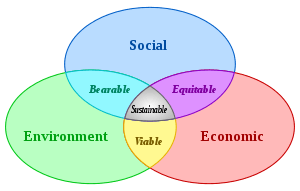Energy independence
Energy independence is independence or autarky regarding energy resources, energy supply and/or energy generation by the energy industry.
Energy dependence in general refers to either mankind's general dependence on primary or secondary energy for energy consumption (fuel, transport, automation, etc.). In a narrower sense, it may describe the dependence of one country on energy resources from another country.
Energy dependency shows the extent to which an economy relies upon imports in order to meet its energy needs. The indicator is calculated as net imports divided by the sum of gross inland energy consumption plus bunkers.
Energy dependence has been identified as one of several factors (Energy sources diversification, Energy suppliers diversification, Energy sources fungibility, Energy transport, Market liquidity, Energy resources, Political stability, Energy intensity, GDP) negatively contributing to energy security.[2] Generally, a higher level of energy dependence is associated with higher risk, because of the possible interference of trade regulations, international armed conflicts, terrorist attacks, etc..[3][4][5][4]
A crucial contribution on the road to energy independence is energy efficiency because efficient use of energy can build on individual efforts in power saving instead of having to rely on costly large-scale infrastructure.
Energy independence, while being attempted by large or resource-rich and economically strong countries like the United States[6][7], Russia[8], China[9][10] and the Near[11] and Middle East[12][13], is an idealized status that at present can only be approximated through non-sustainable exploitation of a country's (non-renewable) natural resources.[14][15][16][17] Another factor in reducing dependence is the addition of renewable energy sources to the energy mix. Usually, a country will rely on local and global energy renewable and non-renewable resources, a mixed-model solution that presumes various energy sources and modes of energy transfer between countries like electric power transmission, oil transport (oil and gas pipelines and tankers), etc. The European dependence on Russian energy is a case in point; Russia is Europe's main supplier of hard coal, crude oil and natural gas.[18]
Planning and coordination in the strive for energy independence is the business of energy policy and energy management
See also
Related concepts
- Energy resilience
- Energy development
- Efficient energy use
National efforts
References
- "Error". ec.europa.eu.
- "Energy security indices in Europe / Economic Challenges for Energy Workshop February 7-8th 2011, Madrid" (PDF). https://eforenergy.org/. 2011. External link in
|publisher=(help) - Hölsgens, Rick (2019). "Resource dependence and energy risks in the Netherlands since the mid-nineteenth century". Energy Policy. Elsevier BV. 125: 45–54. doi:10.1016/j.enpol.2018.10.020. ISSN 0301-4215.
- Bluszcz, Anna (5 May 2016). "European economies in terms of energy dependence". Quality & Quantity. Springer Nature. 51 (4): 1531–1548. doi:10.1007/s11135-016-0350-1. ISSN 0033-5177. PMC 5486912.
- Bryce, Robert (2008). Gusher of lies : the dangerous delusions of energy independence. New York: PublicAffairs. ISBN 978-1-58648-321-0. OCLC 174112731.
- Homans, Charles (3 January 2012). "Energy Independence: A Short History". Foreign Policy. Retrieved 10 July 2019.
- Lack, Simon (28 January 2019). "American Energy Independence Is Imminent". Forbes. Retrieved 10 July 2019.
- "International - Analysis - U.S. Energy Information Administration (EIA) - Russia". 9 July 2019. Retrieved 10 July 2019.
- Zhao, H. (2018). The Economics and Politics of China's Energy Security Transition. Elsevier Science. p. 106. ISBN 978-0-12-815153-2. Retrieved 10 July 2019.
- Li, Xing; Clark, Woodrow W. (2018). "Energy Economics in China's Policy-Making Plan". Sustainable Cities and Communities Design Handbook. Elsevier. pp. 325–349. doi:10.1016/b978-0-12-813964-6.00017-3. ISBN 978-0-12-813964-6.
- El-Katiri, Laura (1 January 2014). "A Roadmap for Renewable Energy in the Middle East and North Africa". ORA. Retrieved 10 July 2019.
- "A Bright Future For Solar Power In The Middle East". Global Economic Intersection. 23 April 2016. Retrieved 10 July 2019.
- Nematollahi, Omid; Hoghooghi, Hadi; Rasti, Mehdi; Sedaghat, Ahmad (2016). "Energy demands and renewable energy resources in the Middle East". Renewable and Sustainable Energy Reviews. Elsevier BV. 54: 1172–1181. doi:10.1016/j.rser.2015.10.058. ISSN 1364-0321.
- "When will fossil fuels run out?". Ecotricity. Retrieved 10 July 2019.
- Simon, C.A. (2007). Alternative Energy: Political, Economic, and Social Feasibility. Rowman & Littlefield Publishers. p. 135. ISBN 978-0-7425-4909-8. Retrieved 10 July 2019.
- RenewEconomy, Giles Parkinson (9 April 2014). "Arvizu: Why the Current Energy System Is Unsustainable". Greentech Media. Retrieved 10 July 2019.
- "Unsustainable Energy". CELDF. 4 August 2015. Retrieved 10 July 2019.
- "Russia has maintained though throughout the whole period 2007-2017 its position as the leading supplier to the EU of the main primary energy commodities – hard coal, crude oil and natural gas" https://web.archive.org/web/20191019113648/https://ec.europa.eu/eurostat/statistics-explained/index.php/Energy_production_and_imports
